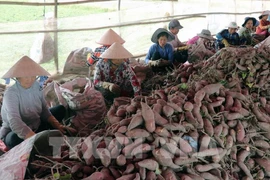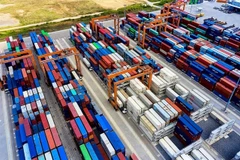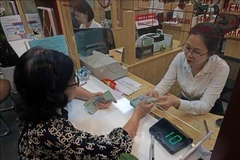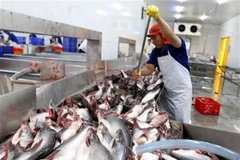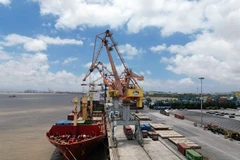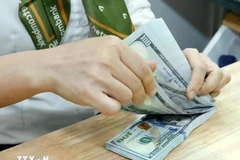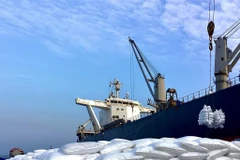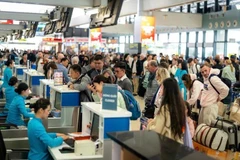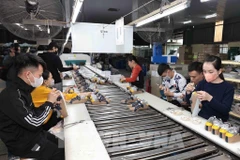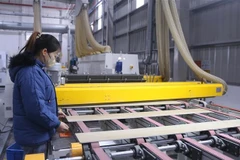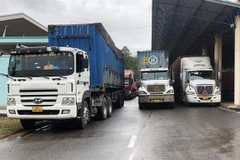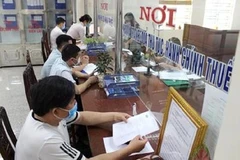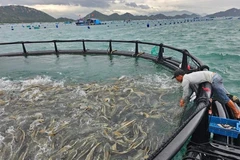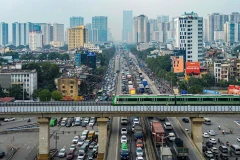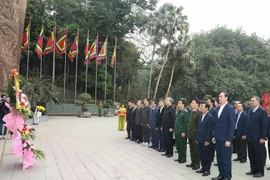According to Minister of Agriculture and Rural Development Le MinhHoan, China is no longer an easy market due to increasingly stricterregulations to protect consumers' health.
The standard of living is also increasing, meaning Vietnam'senterprises cannot maintain old production and business methods for farmproduce exported to China.
MARD has proposed to strengthen the update of legal provisions onfood safety and propaganda on safe food production according to regulations andrequirements of Vietnam and China.
Order 248, regarding "Regulations on the registration ofenterprises producing imported foreign food", and Order 249, on"Measures to manage import and export food safety", of China tookeffect from January 1, 2022.
The ministry will strictly supervise, inspect and follow up withenterprises according to the regulations on ensuring food safety in Vietnam andChina. It will also strictly handle violations of food safety.
Tran Thi Bich Ngoc, head of Mong Cai International Border GateManagement Board, said to promote Vietnam's agricultural exports to China,enterprises needed to change further thinking, management, production andbusiness methods.
The enterprises should constantly improve the quality of goodsfrom farming, catching, processing, packaging and transport for the exportproducts, Ngoc said.
They must accelerate the change of production methods towardssafety, having specific standards, farming process management, and meetingChina's requirements.
She said they also needed to actively strengthen linkages betweenmanufacturers and exporters to exploit this market.
Nguyen Thi Thanh Thu, Chairwoman of Bagico Joint Stock Company inBac Giang province, said Vietnamese agricultural products must overcome fiercecompetition when penetrating deeply into the Chinese market.
For example, Vietnam's durian products would have to compete withthose from Thailand.
In addition, in the past, Vietnam only had to compete with bordertraders. Now, Vietnamese agricultural products would have to compete directlywith official importers and corporations with a lot of money.
Despite having experience in doing business with the Chinesemarket for five years, Nguyen Duc Hung, Director of Hoan Cau Import and ExportJoint Stock Company, said it was quite difficult to export goods to Chinabecause this market had constantly amended the Food Safety Law.
Chinese partners often make sudden change announcements, makingmany businesses passive in the preparation stage, especially for the businessesnewly doing business with China.
A representative of Phuong Anh Seafood Joint Stock Company in MongCai vity, Quang Ninh province, said that it had been importing and exportingagricultural, forestry and aquatic products to China for more than 20 years.
However, since the beginning of 2023, the company had not beenallowed to export raw oysters to China, without a reason. It hoped that therelevant authorities of the two countries would have more specific guidance onprocesses, regulations and conditions for import and export enterprises.
In the cassava industry, Nghiem Minh Tien, Permanent Vice Chairmanof the Vietnam Cassava Association, said that every year, Vietnam had exportedmore than 3 million tonnes of cassava starch products to China, mainlyunofficial exports.
To facilitate the exports, Tien said it was necessary to havestability in border trade policies.
"If there is a change, it also needs a reasonable adjustmenttime for enterprises to avoid sudden changes, causing great losses to theproduction and business of enterprises."
The Ministry of Industry and Trade said that Vietnam wouldgradually shift from an unofficial to an official quota in border tradeactivities to overcome the congestion of agricultural products at the bordergate.
According to the draft on amending Decree 14/2018 on border tradeactivities, the ministry proposes to reduce exports under the unofficialcategory from January 1, 2025. The unofficial exports will need to meetstricter quality and traceability standards.
From 2028, goods will only be exported via land borders underofficial quotas./.



